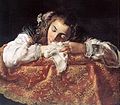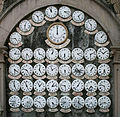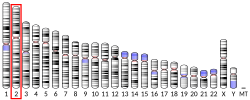A circadian clock, or circadian oscillator, also known as one’s internal alarm clock is a biochemical oscillator that cycles with a stable phase and is...
37 KB (4,473 words) - 07:35, 3 June 2024
the environment (is entrained by the environment). Circadian rhythms are regulated by a circadian clock whose primary function is to rhythmically co-ordinate...
110 KB (12,823 words) - 07:51, 24 December 2024
CLOCK (backronym for circadian locomotor output cycles kaput) is a gene encoding a basic helix-loop-helix-PAS transcription factor that is known to affect...
33 KB (3,940 words) - 16:06, 10 June 2024
Sleep (section Circadian clock)
in the function of the endocrine and immune systems. The internal circadian clock promotes sleep daily at night, when it is dark. The diverse purposes...
107 KB (12,370 words) - 15:07, 18 December 2024
These biological clocks control processes that fluctuate daily (e.g., body temperature, alertness, hormone secretion), generating circadian rhythms. Among...
27 KB (3,118 words) - 06:49, 18 December 2024
Suprachiasmatic nucleus (category Circadian rhythm)
oscillators (see Circadian rhythm) in mammals are sensitive to temperature pulses and will experience resetting of the circadian clock phase and associated...
39 KB (4,426 words) - 02:31, 18 December 2024
Basic helix-loop-helix ARNT-like protein 1 (redirect from BMAL1-Clock)
generating molecular circadian rhythms. Research has revealed that BMAL1 is the only clock gene without which the circadian clock fails to function in...
50 KB (5,804 words) - 12:38, 18 October 2024
Light effects on circadian rhythm are the response of circadian rhythms to light. Most animals and other organisms have a biological clock that synchronizes...
27 KB (3,164 words) - 22:05, 30 November 2024
E-box (section Role in the circadian clock)
not for circadian rhythmicity. It also works independently as a target of the BMAL1/CLOCK complex. The E-box plays an important role in circadian genes;...
30 KB (3,663 words) - 06:09, 22 November 2023
Ravi Allada (section Drosophila circadian rhythms)
positionally cloned the Drosophila Clock gene. In his laboratory at Northwestern, he discovered a conserved mechanism for circadian control of sleep-wake cycle...
39 KB (4,533 words) - 20:10, 16 September 2024
Period (gene) (redirect from PER (circadian clock))
central role in the molecular mechanism of the Drosophila biological clock driving circadian rhythms in eclosion and locomotor activity. Mutations in the per...
21 KB (2,385 words) - 07:34, 19 June 2024
CREB (section Involvement in circadian rhythms)
corticotropin-releasing hormone), and genes involved in the mammalian circadian clock (PER1, PER2). CREB is closely related in structure and function to...
19 KB (2,243 words) - 23:46, 9 September 2024
that keep cells on a roughly 24-hour schedule. This oscillator, or "circadian clock," is made up of a transcription-translation feedback loop (TTFL) in...
46 KB (5,389 words) - 00:53, 27 March 2024
Cryptochrome (section Circadian rhythm)
and mammal-like (Type II). CRY1 is a circadian photoreceptor whereas CRY2 is a clock repressor which represses Clock/Cycle (Bmal1) complex in insects and...
59 KB (6,478 words) - 07:51, 24 December 2024
Jet lag (redirect from Circadian dysrhythmia)
by shift work and circadian rhythm sleep disorders. When travelling across a number of time zones, a person's body clock (circadian rhythm) will be out...
24 KB (2,923 words) - 02:38, 4 December 2024
Zeitgeber (category Circadian rhythm)
zeitgeber, influence the timing of these internal clocks. Light (light is the most potent regulator of circadian rhythms). Atmospheric conditions Medication...
17 KB (2,127 words) - 12:51, 3 September 2024
central and peripheral clocks. Similarly to how circadian clocks operate in Drosophila and mammals, the monarch circadian clock uses a transcription translation...
134 KB (13,606 words) - 03:00, 24 December 2024
Translation Negative Feedback Loop for circadian clocks in 1990. In 1998, they discovered the cycle gene, clock gene, and cryptochrome photoreceptor in...
27 KB (2,781 words) - 18:35, 12 December 2024
group discovered the genetic basis for the mammalian circadian clock in 1994 and identified the Clock gene in 1997. Takahashi was elected to the National...
25 KB (2,625 words) - 17:39, 4 December 2024
1966 to test whether humans, like other species, have an intrinsic circadian clock. It was started by Jürgen Aschoff and Rütger Wever of the Max Planck...
14 KB (1,719 words) - 08:26, 23 March 2024
Bacterial circadian rhythms, like other circadian rhythms, are endogenous "biological clocks" that have the following three characteristics: (a) in constant...
41 KB (5,029 words) - 04:55, 12 August 2024
Period circadian protein homolog 1 is a protein in humans that is encoded by the PER1 gene. The PER1 protein is important to the maintenance of circadian rhythms...
16 KB (2,049 words) - 22:25, 2 January 2024
Aziz Sancar (section Research on circadian clock)
biologist specializing in DNA repair, cell cycle checkpoints, and circadian clock. In 2015, he was awarded the Nobel Prize in Chemistry along with Tomas...
28 KB (2,513 words) - 15:10, 24 December 2024
Advanced sleep phase disorder (category Circadian rhythm)
of sleep and melatonin levels are regulated by the body's central circadian clock, which is located in the suprachiasmatic nucleus in the hypothalamus...
21 KB (2,708 words) - 13:13, 25 June 2024
Circadian Clock Associated 1 (CCA1) is a gene that is central to the circadian oscillator of angiosperms. It was first identified in Arabidopsis thaliana...
13 KB (1,552 words) - 07:35, 3 June 2024
Delayed sleep phase disorder (redirect from Delayed Circadian Rhythm Disorder)
sleep–wake phase disorder, is the delaying of a person's circadian rhythm (biological clock) compared to those of societal norms. The disorder affects...
60 KB (7,638 words) - 00:02, 21 December 2024
rhythms Internal clock, the timeframe sensed by the individual's body which is largely affected by the light-dark cycle Circadian clock, a molecular mechanism...
1 KB (202 words) - 19:56, 1 June 2022
encode components of the circadian clock, which regulates the daily rhythms of locomotor activity, metabolism, and behavior. Circadian expression of these...
14 KB (1,760 words) - 23:47, 9 September 2024
animals, including humans. This is because the circadian clocks are fundamentally similar. Drosophila circadian rhythm was discovered in 1935 by German zoologists...
26 KB (3,349 words) - 19:00, 16 September 2024
Jay Dunlap (section Identification of PAS-PAS heterodimers as activators in the circadian feedback loop)
Jay Dunlap include his work investigating the role of frq and wc clock genes in circadian rhythmicity, and his leadership in coordinating the whole genome...
46 KB (5,409 words) - 17:57, 22 June 2024

















